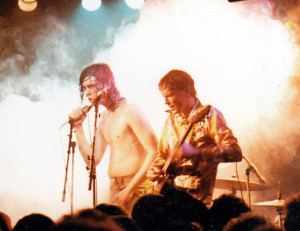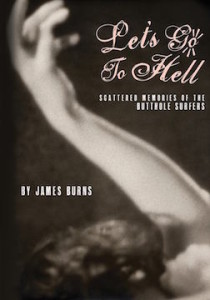Interview with James Burns, author of LET’S GO TO HELL: SCATTERED MEMORIES OF THE BUTTHOLE SURFERS
The Butthole Surfers were the most important band I listened to during my formative teen years. They were my Beatles, my Grateful Dead, my One Direction(?). From the first time I heard frontman Gibby Haynes bellow ‘SATAN! SATAN! SATAN!’ at the beginning of “Sweat Loaf” on their 1987 album Locust Abortion Technician to my first BHS concert at the Ritz in New York City—featuring fog machines, strobe lights, flaming cymbals, penis surgery movies, and a nearly bald, entirely naked go-go dancer—I was hooked. The Butthole Surfers spoke to me, and I haven’t been the same since.
An old friend of mine, James Burns, has written the definitive, long-overdue Butthole Surfers book, LET’S GO TO HELL: SCATTERED MEMORIES OF THE BUTTHOLE SURFERS. Also capturing the socio-political climate under the Reagan regime, it features scores of rare photos and anecdotes from many punk rock luminaries.
Jim was kind enough to answer a few questions about the book and his memories of BHS close encounters:
Q: What makes the Butthole Surfers worthy of a biographical book?
A think a lot of people have forgotten just how important the Butthole Surfers were in the evolution of alternative rock, and of rock music in general.
They were one of the first bands to fully incorporate the complete history of rock music into the context of punk rock, and certainly one of the most successful bands to do so, in the 80s especially.
After most of punk rock was becoming unmotivated, around 1986-87, the Buttholes were there to remind folks the reasons we were drawn to punk rock in the first place. The fact that they could do that while playing 10-minute long improv jams remains a pretty amazing feat.
By 1989 or so, after they became a quartet, they were writing serious rock songs. The thing is, they weren’t putting out records. Their 4-song ep Widowermaker only alluded to what they were doing live. They had dozens of tunes that didn’t get released until later on. If you want to know who built the bridge between punk rock and grunge, I would argue the Buttholes were THE band to do it.
I also think they are an amazing study of how to run a band, and that any band can make it, no matter the name or style of music, providing you are committed (or committable) enough. They were real troubadours.
Q: What musicians influenced the Buttholes? How have the Buttholes influenced other musicians?
I don’t think the band was limited to any particular influence, per se. They’ll perhaps mention their love of The Fall, Television, or the Jam, Black Sabbath of course, or Grand Funk Railroad, or even Walter Brennan. And you can hear all those influences and a million more in their sound, which changed remarkably from record to record. I think it was their willingness to incorporate all music, regardless of the so-called ‘genre’, that made them so great.
As far as musicians they influenced, that list is too long to mention. Let’s just say that Nirvana, the Red Hot Chili Peppers, and Green River were all opening for THEM in the 1980s. Jane’s Addiction and Dinosaur Jr are among those they’ve influenced as well. There are very few bands of any importance in the 80s who were not anxiously awaiting the next Butthole Surfers record. Pretty much any band that was incorporating the freak power mentality of the 1960s into the realm of punk rock owes their debt, in part or in full, to the Butthole Surfers. Period.
Q: The Butthole Surfers live shows were legendary. What made them so remarkable?
Butthole Surfers concerts were completely lawless. People forget what it was like in the 1980s. Edwin Meese, the PMRC, Jerry Falwell; the FCC overreach into content; the Mapplethorpe/National Endowment of the Arts debate. The whole Reagan administration had been bent on suppressing any views that didn’t fit into the conservative Christian values he prescribed to. Let’s not forget, Reagan sent troops into People’s Park to shoot protesters BEFORE Kent State—this was not a man to be trifled with. I think the song “U.S.S.A” really strikes at the heart of what was going on at the time so eloquently.
The Butthole Surfers’ shows sort of held up a mirror to society, without being overtly political. True freedom in a time of repression is dangerous to the powers that be, but no one would touch them. I don’t think Tipper Gore would want the Butthole Surfers dragged before Congress to debate whether their records were dangerous, which is what made the band that much more dangerous to their bogus family values.
Q: How did their notorious name originate? How did their name affect their marketability?
In that same vein, the band name prevented them from being mentioned in many newspapers and magazines, even on college radio. The FCC was fining college and commercial stations for indecency, and program directors were scared. I mean, even in 1996 they released a “clean” version of Electriclarryland with their name blocked out on the cover. Their name was probably the biggest obstacle to their success, early on. It wasn’t until grunge became popular that the majors would even THINK about being able to promote them.
The legend goes that they settled on the name after having a different name every day. They finally got a paid gig as the Butthole Surfers and figured it was a good omen. Not sure if they realized at the time how much grief it would cause them later on.
Q: How were you introduced to the Buttholes?
My pal Dafydd was buying records like mad, and he bought most everything on the Alternative Tentacles label. He brought over A Brown Reason to Live to my house in 1984 or so. I dug it, but it took a while for me to get fully into them. When their song “Moving to Florida” came out, my other pal Kevin and I used to crack up to it. But it wasn’t until I heard an interview on WNYU in 1987 that I was finally intrigued enough to go see them live. I did, and that was it. My 16-year-old straight-edge mind was completely blown. I was converted.
Q: Why did you decide to write the book? What was it like writing it? What kind of challenges did you face?
I was running the Anal Obsession, and just accumulating recordings and talking to a lot of former band members and their friends, mostly just looking to score more shows. Through that, a narrative started to develop. I started writing it about 5 years ago, and after about a year or so, started seriously seeking out interviews.
I knew that Chuck Young was trying to write a book about them and he was unable to pull it off, even though he was close friends with them! We had even chatted once about it long before I’d started writing. God bless Chuck… there is a special wing in heaven for him.
Anywho, Chuck’s inability to get it done makes my attempt even that much more presumptuous, but I think my LACK of attachments to the band actually HELPED. I didn’t get led on all the wild goose chases the band used to like to lead serious journalists on. Chuck had more fun in the process, but I got the information I needed to finish a book.
The biggest challenge was just that. The band was constantly goofing around and rarely gave a serious interview. I must have read hundreds of articles, piecing together stories and comparing show dates to time frames to come up with some semblance of the ‘truth’ and then, later on, interviewing folks to get the best recollections/corroborations. It took me five solid years of writing, and honestly about 25 years of collecting and research to complete. It was not a job for a sane and rational person.
Q: What was your most surprising discovery about BHS when researching the book?
I guess it was surprising that I actually got denied a couple of interviews because of the whole Touch & Go lawsuit thing. I’m kind of surprised that folks are still so hung up about it they wouldn’t even talk to me about the band.
I really feel that the band got short-changed in that whole thing, in more ways than just that they weren’t getting paid properly. It’s a real shame that the lawsuit remains their legacy in many ways.
Things are much different now. Bands rarely stay on the same indie record label for as long as the Buttholes did, but the precedent the lawsuit set was actually good for bands and their art. No label should own a band’s music hostage in perpetuity. Corey was making more per record than the members in the group. How is that fair?
So there’s that, and also just how dern<sic> nice and supportive so many people have been to me, and supportive of the project. A lot of folks have shown the love. I feel blessed to have met so many great artists and people over the course of writing it. It really is humbling.
Q: What is your favorite BHS anecdote? Your personal fondest BHS memory?
My fondest Butthole memory is still that 12/12/87 Ritz show, the one that got us onto the cover of Double Live. What a show that was, huh?!
Seriously, though, there is one thing that Teresa said to me which really stands out.
She says that the band had an unspoken code to not discuss what things “meant.” So many interviewers were asking them what their name meant, what their stage shows meant and what their songs were about. They would lead journalists on wild goose chases and such just to avoid having to place meaning behind everything they were doing.
That said, she mentioned that the song “Perry” is about everyone trying to find meaning behind it all. (”It’s about licking the shit off the floor…”)
Where and when will the book be sold?
The book just came out on August 27, and right now is available through Amazon and Barnes & Noble. I’ll also be selling it direct through the CHEAP DRUGS RECORDS Facebook page within the next month or two.
Amazon link — LET’S GO TO HELL: SCATTERED MEMORIES OF THE BUTTHOLE SURFERS
Barnes & Noble link — LET’S GO TO HELL: SCATTERED MEMORIES OF THE BUTTHOLE SURFERS





KMO
Howdy. It’s 2023, and I’m looking furiously for a copy of this book. Any chance you have James Burns’s email so that I can trade my first born for a read? Thanks for the interview. This band changed my life. Funny thing about no regrets….
Cheers